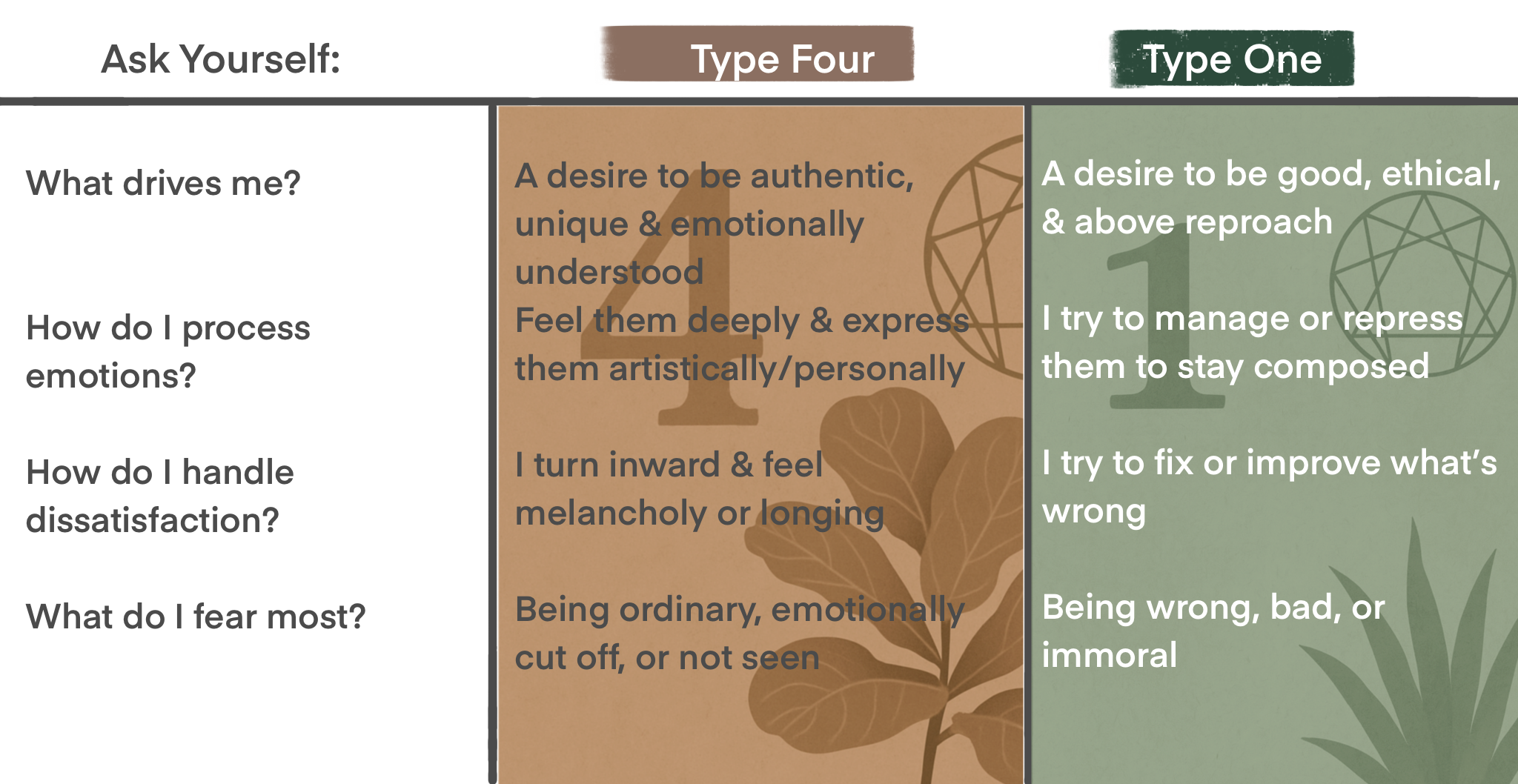In-Depth Comparison
At first glance, Fours and Ones might not seem similar; one is expressive and emotional, the other is disciplined and principled. But both types share a deep sense of idealism, a belief that things should be different or better, whether that means the world, the people around them, or themselves.
Type Fours internalize this dissatisfaction as a longing for authenticity or wholeness. They feel their emotions deeply and often see themselves as fundamentally different from others, either beautifully unique or tragically flawed. Fours are motivated by a desire to understand who they truly are and to be seen as emotionally and aesthetically authentic.
Type Ones, on the other hand, externalize that dissatisfaction into a drive to improve the world. They see what's wrong and feel responsible for fixing it. Ones are motivated by a sense of duty, morality, and inner criticism, a voice that constantly pushes them toward perfection and away from guilt or “badness.”
Both types can be serious, introspective, and dissatisfied, but their focus differs.
Fours tend to romanticize flaws and lean into emotional intensity.
Ones repress their emotions to stay rational and “in control.”
Fours seek meaning and identity,
While Ones seek rightness and integrity.
Fours feel their inner chaos and express it.
Ones feel their inner chaos and try to discipline it into order.
If you're stuck between these two types, ask yourself:
Do I feel like something inside me is missing or broken (Four), or like I constantly fall short of a moral ideal (One)?
Am I striving for authenticity (Four), or for goodness (One)?
Quick Spot-the-Difference Table
Special Considerations & Deeper Theory
Different Intelligence Centers
Fours are in the Heart Center, filtering experience through emotions, identity, and longing.
Ones are in the Gut Center, processing the world through instinct, body tension, and a focus on right and wrong.
Still, these types can look similar when a One becomes highly self-critical or emotionally suppressed, and when a Four leans into structure or personal responsibility in an attempt to improve.
Shared Depth and Idealism, But Different Sources
Both types care deeply about integrity, authenticity, and what’s missing in the world.
Fours idealize beauty, meaning, and emotional depth. Their grief tends to center around what’s missing, misunderstood, or lost.
Ones idealize moral goodness and personal improvement. Their grief tends to be about what’s broken or unjust.
This shared focus on idealism and identity work can cause confusion, especially in creative Ones or disciplined Fours.
Stress and Growth Arrows Create Overlap
Fours go to One in growth, becoming more structured, principled, and self-disciplined. A healthy Four may say, “I need to put this into action, I want to live with purpose,” which can sound very One-like.
Ones go to Four in stress, taking on traits like emotional intensity, moodiness, and a sense of isolation or inadequacy. A stressed One may think, “Maybe I’m just too sensitive to live in this broken world”, a classic Four sentiment.
This arrow overlap is a common reason for mistyping, especially when someone is actively working on themselves or has lived through a long period of emotional stress.
Wing Influence: 1w9 and 4w5
A 4w5 often leans into intellectual rigor and solitary idealism, which can resemble a philosophical or perfectionistic One.
A 1w9 may appear more introspective, withdrawn, or idealistic, blurring into Four territory, especially if creativity or melancholy is present.
Soul Child Theory
Four’s soul child is One, the part that wants clarity, structure, and inner order.
One’s soul child is Seven, the part that wants freedom, joy, and spontaneity.
This dynamic means that Fours doing deep integration work may start showing strong One traits… but that doesn’t mean they are a One. It's just the part of them that's seeking grounding and purpose.
Common Mistyping Pitfalls
You might think you're a Four if you're a One who feels emotionally intense, artistic, or misunderstood, especially if you’re burned out from trying to be “good.”
You might think you're a One if you're a Four who values structure, responsibility, and doing the right thing, especially if you’ve adapted to an achievement-oriented environment.
Reflect & Explore
When something feels “off,” do I want to fix it (One) or feel it more deeply (Four)?
Do I put more energy into expressing truth (Four) or upholding correctness (One)?
Do I believe I’m too much or not enough (Four), or that I should be better (One)?

